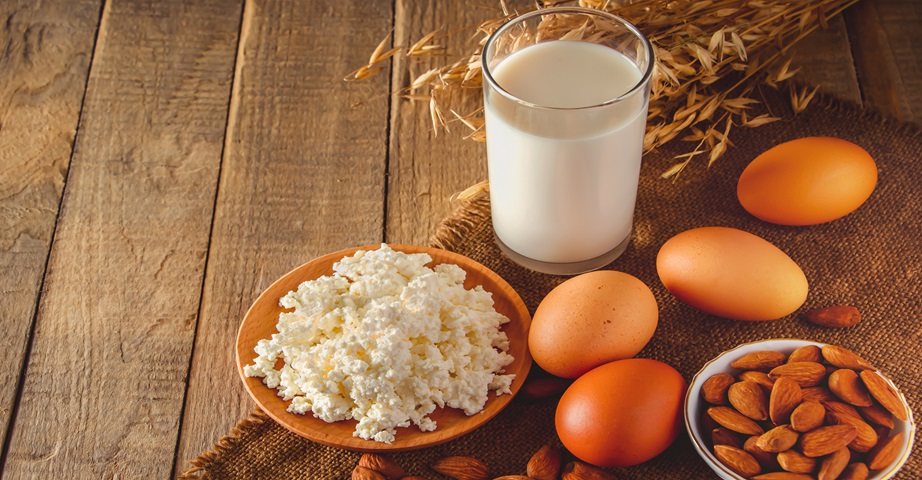Protein before or after training? When to use protein supplement?

Protein is one of the basic macronutrients supplied to the body along with the daily diet, which is necessary for the proper functioning of the body. Among physically active people, adequate protein supply can support the building of muscle mass, as well as positively affect the regenerative processes occurring in the body after the end of activity. When to drink protein - before or after training? How to take protein in powder? What benefits can be derived from consuming protein before exercise, and what benefits can protein supply after training have?
Summary
- What is protein and what role does it play in the human body?
- Protein requirement - how much protein should you consume each day?
- Protein supplement - before or after training? When to take protein?
- Protein before training - advantages
- Protein after training - benefits
- Protein in non-training days - is it worth it?
- Protein and weight reduction - when to drink protein during weight loss?
- How to use protein?
- Sources of protein in the diet
What is protein and what role does it play in the human body?
Protein is one of the three macronutrients necessary for the proper functioning of the body. It is a macromolecular chemical compound that is formed from amino acid residues connected by peptide bonds. The proteins constitute about 20% of human body weight and perform various functions in the body, constituting, among others, a building, regulating or transporting component. The protein is a component of hormones and enzymes that can contribute to maintaining the pH of body fluids. In addition, the compound is necessary for proper growth and development and building muscle mass, and in the case of insufficient supply of carbohydrates, the protein in the body can also perform energy functions.
The protein deficiency in the daily diet, as well as excess protein in the body, is not a desirable phenomenon and can contribute to the occurrence of unintended phenomena. Insufficient supply of the macronutrient may result in weakening of immunity and prolonging the wound healing process, and may promote the loss of muscle mass. In turn, too high protein intake can disturb the acid-base balance of the body and increase the risk of developing osteoporosis, as well as kidney stones.
Protein requirement - how much protein should you consume each day?
Daily protein needs to depend on many different factors, including age, type of physical activity or health. An adult and healthy person with a moderate activity lifestyle should provide the body with 0.8-1.0 g of the protein per kilogram of body weight. On the other hand, physically active people should increase the daily supply of the proteins to meet the increased demand of the body.
- In endurance sports, such as swimming or running, it is recommended to provide 1.2-1.4 g of the protein per kg of body weight per day.
- In strength sports, the demand for the valuable macronutrient can be 1.4-1.8 g per kg of body weight per day.
- People whose goal is to increase muscle mass may consider using up to 1.6-2.5 g of the protein per kg of body weight per day.
Recommended products
Protein supplement - before or after training? When to take protein?
Almost every person leading an active lifestyle uses protein supplements, regardless of age, level of advancement and sports discipline. Some people reach for high-protein supplements because they have difficulty providing the right amount of the protein with their daily menu, others - to diversify their diet. Protein supplements are a concentrated source of the protein and valuable support for the athlete's body. Protein preparations can intensify anabolic processes and support the building of muscle mass, as well as support the repair processes of microtraumas created during training and inhibit the protein breakdown, while limiting catabolic processes.
Therefore, there is no doubt that the protein is an important macronutrient in the diet of athletes and physically active people. So the question remains when to take the proteins, and what does the protein give after training, and what benefits can be associated with the use of the compound before starting exercise?
Protein before training - advantages
The protein before training, especially when consumed with carbohydrates, can provide energy to the body, and thus positively affect the effectiveness of physical exercise. Because protein supplements provide the body with amino acids and protect against catabolic processes, consuming protein shakes before training can also contribute to increasing muscle protein synthesis and intensifying anabolic processes, and thus, it can have a positive effect on the development of muscle mass and efficiency during exercise. The protein intake before training can also prevent hunger during activity and promote the release of macronutrients during exercise, and this can have a positive effect on muscle regeneration.
When deciding to use a protein supplement before physical activity, it is worth considering that the proteins must be digested and absorbed by the body. Therefore, when using pre-workout, high-protein dietary supplements, it should be remembered that their consumption should take place at least one hour before the start of physical exercise, and not just before training.

Protein after training - benefits
The protein after training is often used by athletes, because it provides the body with valuable amino acids, and thanks to this it can support post-workout muscle regeneration, accelerate the repair of micro-injuries of muscle fibres created during the activity and allow faster return to full condition and start the next training. In addition, the protein consumed after exercise can promote the inhibition of catabolic processes and increase anabolism, accelerating the rate of muscle mass growth. What's more, providing the right portion of the protein after exercise allows inhibition the feeling of hunger and ensures satiety.
When deciding to use the protein after training, it is worth reaching for an easily digestible source of the protein immediately after finishing the activity or eating a balanced meal containing the protein after returning from the gym to home. However, it is worth consuming the post-workout meal within two hours of the end of the activity, because then the rate of glycogen resynthesis is the fastest.
How to dose the protein? How much the protein should consume after training? This is an individual issue that depends on the daily demand for the macronutrient. General recommendations suggest that after endurance exercise, provide the body with about 10-20 g of the protein, while after strength training, can consume up to 30 g of the protein at a time.
Protein in non-training days - is it worth it?
An often emerging issue among physically active people is also the question of whether it is worth using the protein on non-training days. Because the process of regeneration after physical exertion can be a long-term phenomenon, you should not give up the portion of protein supplement consumed on a day free from intense workouts - providing the body with valuable amino acids during the day intended for muscle regeneration may accelerate the return of muscle tissue to full conditions and allow performing another physical effort faster.
Protein and weight reduction - when to drink protein during weight loss?
The protein during weight loss is also an important component of the daily diet, which can increase the feeling of satiety, reduce appetite and hunger, and what is more, can support postprandial thermogenesis. At the same time, the macronutrient can prevent muscle catabolism, which is a common phenomenon among people on a reduction diet. For this reason, among slimming people, it is also recommended to increase the supply of the protein along with the daily menu.
When to use protein supplements for weight eduction? As in other cases, this is an individual matter. Protein shakes can be drunk both before and after physical activity. A good solution may also be eating protein in both before and after training, which can positively affect the synthesis of muscle proteins, inhibit the feeling of hunger, and it can also enable faster and more effective post-workout muscle regeneration.

How to use protein?
The right portion of protein supplement depends on the purpose of using a dietary supplement, as well as on age, body weight or human health. The type of the protein used is also extremely important. Therefore, the best solution and the answer to the question of how to take the protein is to follow the guidelines of the manufacturer of the selected preparation.
Athletes usually prepare protein shakes based on protein supplements, mixing preparations containing the desired macronutrient with water, milk or vegetable drink. And although it is the simplest solution, protein preparations can also be used as an addition to fruit cocktails, basic meals, such as pancakes, as well as desserts or baked goods. However, it is important not to abuse protein supplements, but to adjust the amount of the supplement used to the needs of the body and a carefully planned, balanced diet.
Sources of protein in the diet
Proteins delivered to the body in the form of a protein supplement or a high-protein cocktail are a convenient and easily digestible source of the valuable macronutrient. And although protein supplements may be helpful in meeting the increased demand for the proteins, the basis of the diet should be a healthy and balanced menu that provides the body with both animal and vegetable protein. Therefore, in the daily diet, it is worth including products such as:
- meat,
- fishes,
- milk and milk products,
- eggs,
- legumes,
- nuts,
- cereal products.
It should be crucial for athletes to provide the body with the right amount of protein every day to meet the increased demand of the body and allow to achieve the desired training results and positively affect the processes of muscle regeneration. The time of taking protein is really a secondary issue - the proteins can be consumed before physical exercise, after its completion or both before and after training. Each of the selected variants can have a positive effect on the body, and the specific time of using a protein supplement is an individual matter, which depends on the priorities and expectations of the player.
Learn more:

